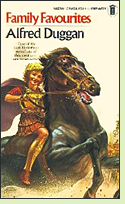Family Favourites
by Alfred Duggan
Reviewed by David Maclaine

In Family Favourites Alfred Duggan tells the story of Elagabalus, Stephen Colbert's "favorite crazy Roman Emperor." Crazy is debatable, but he is surely one of the oddest. Duggan's novel begins with the backstory of its narrator, a Roman soldier who resists promotion because officers must take an oath of allegiance to the emperor, a vow hard to keep in an environment rife with assassinations, coups and civil war. His conscience is therefore clear after the Emperor Caracalla is assassinated while on campaign in the east and replaced by the unpopular Praetorian Prefect Macrinus. When a rival arises in the person of an attractive thirteen-year old cousin of the former emperor, our narrator is the first to suggest that Macrinus' forces switch sides. Soon he is a close confidant of a new emperor, who calls himself Elagabalus after the Syrian god - in the form of a large phallic stone that fell from the sky - whom he serves as a priest.
Young Elagabalus' fondness for chariot racing, along with the bizarre, pants-free attire he dons for his priestly duties, does not endear him to the staid Romans he must deal with in the capitol. His attempt to reconcile his Syrian god with Rome by marrying the chief vestal is a predictable failure. She does remain a virgin, thanks to Elagabalus' unshakeable homosexuality. This determined preference frustrates his mother, who mimics many a clueless mom throughout history in her dogged belief that he'll come over to liking women if he'll only give them a try. The teenaged chariot buff finds an amusing use for his mother's unwanted gift of twenty-four Syrian courtesans, one that will enthrall devotees of pony play. It's not hard to guess the lad's reign will be short. But while the ride lasts, Family Favourites provides some sly entertainment with a worthwhile question at the core: Why should bloody tyrants last longer on the throne than a generous youth whose many quirks include an aversion to cruelty? (1963, 253 pages)
More about Family Favourites at Amazon.comFamily Favourites appears on the list of The 50 Best Historical Novels for a Survey of Ancient Roman History
Other novels about Elagabalus:
Child of the Sun by Kyle Onstott and Lance Horner (1966), about Elagabalus. More info
Boy Caesar by Jeremy Reed (2004), about a gay man in present-day London who travels to Rome and encounters a man claiming to have lived a past life as Elagabalus. More info
Nonfiction about Elagabalus:
The Crimes of Elagabalus: The Life and Legacy of Rome's Decadent Boy Emperor by Martijn Icks (2011). More info
The Emperor Elagabalus: Fact or Fiction? by Leonardo de Arrizabalaga y Prado (2010). More info
Online:
Elagabalus Emperor of Rome at the ThoughtCo. website
Back to Novels of Ancient History
Back to Directory of Book Reviews